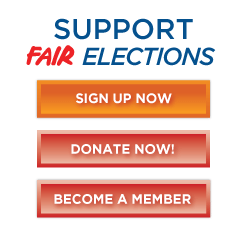Answers to Frequent Questions about the previous California DISCLOSE Act, SB 52 SB 52 Supporters
Why do we need SB 52?Political advertising is more and more often paid for by special interests hiding behind deceptively named organizations. In California, over $425 million was spent on 2012 ballot measures alone, most by corporations hiding behind misleading committees like "Stop Special Interest Money Now" and "2012 Auto Insurance Discounts Act".What does SB 52 do?SB 52 requires the three largest funders of political ads to be clearly identified with their names and logos — on the ads themselves, so voters know who is actually paying for them.What mediums of political ads are covered?SB 52 applies to all mediums of advertising, including TV, radio, print, online, billboards, and websites.What types of political ads are covered?SB 52 applies to ads for or against ballot measures and to third party ads about candidates. It also applies to issue advertisements, like the "Harry and Louise" advertisements against national health care reform in 1994 and for health care reform in 2009. It applies to both state and local races and applies whether ads are paid for by corporations, unions, or millionaires.How will voters be able to find out more?All TV and print ads will be required to list a website that has more disclosure and a link to a page on campaign's website that lists all funders of $10,000 or more for state races ($2,000 or more for state races).What about ads paid for by candidates?State and local candidates will have to appear in their ads and say that they approve the message, as federal candidates do, so voters know they are responsible for the content of their advertising. Candidate ads do not have to list their top three funders because California law limits the size of contributions they can receive.Is SB 52 Constitutional?Yes! The Supreme Court's Citizens United v. FEC decision unleashed unlimited spending on campaigns. But eight out of nine justices specifically noted the problems that result when groups run ads "while hiding behind dubious and misleading names" and said disclosure is necessary "...to provide shareholders and citizens with information needed to hold corporations and elected officials accountable for their positions and supporters.".Other Frequent Questions About How SB 52 WorksSB 52 provides for fines up to three times the expenditure or transfer — fines that could be quite substantial for ads costing hundreds of thousands of dollars or more. It provides California's Fair Political Practices Commission additional audit ability to enforce the law and ensure compliance. No. SB 52 requires new "follow-the-money" disclosure requirements, so that every time an organization transfers political purpose funds to another organization, they must report which original corporate, union, or individual funds are being transferred. That way the committee that ultimately places the ad will know — and be required to report — the actual original contributors, not misleading committee or non-profit names. No. Contributions will be added up to ensure that the largest funders are shown. No. Contributions of $10,000 or more by employees of a corporation will be added to the contributions of the corporation. No. SB 52 has specific requirements of size and legibility of disclosures to ensure they are all clear and readable. Unfortunately, California laws can't cover federal elections. But it covers both state and local races, and if passed could become a model for the rest of the country. A contributor making $10,000 or more in cumulative contributions for state races and $2,000 for local races may be listed, though only the top three funders will be shown on ads. Not if the club pays for the mailer itself and its individual contributors each gave less than $10,000 on state races. SB 52 is meant to make sure the public knows who the Big Money contributors are, so smaller donors don't have to be listed. No. Great care is being taken in drafting SB 52 to not overly burden political advertisers. Television ad disclosures will only have to appear onscreen long enough for people to see the top three funders (three seconds). Radio ad disclosures will actually be significantly shorter than current law, but more effective. Answers About Support for SB 52The previous version of the California DISCLOSE Act, AB 1648 (Brownley), passed the Assembly in August 2012, before running out of time to pass the Senate. SB 52 is based on AB 1648, but has new follow-the-money disclosure rules to make sure the funders shown are the actual original contributors, not misleading committee and non-profit names. It also extends its provisions to sham issue ads (electioneering communications) and issue ads. Because SB 52 amends the Political Reform Act of 1974, it will go into law if it is either (1) passed by a 2/3 vote of the legislature and signed by the governor or (2) passed by the voters after a simple majority vote of the legislature placing it on the ballot. No — California will be leading the way, as it did with the original Political Reform Act of 1974. However, SB 52 has many similarities to the federal DISCLOSE Act (HR 148) that was introduced this January. SB 52 has differences specific to California, such as addressing ballot measures and requiring ads to show logos. SB 52's first votes in the legislature are in the Senate in April. It has to be out of the Senate by June. If it makes it out of the Senate, it would have its first votes in the Assembly in June or July and would have to be out of the Assembly by the first week of September. Governor Brown would then have 30 days to sign or veto the bill. Yes! 84% of Californian voters in the October 13, 2011 Field Poll said they favored legislation that would "Increase the public disclosure requirements of initiative sponsors to more clearly identify who are its major funders." SB 52 is endorsed by both Democratic and Republican local elected officials. Support from voters is across the board, with 86% of Democrats, 78% of Republicans, and 88% of Independents in the October 13, 2011 California Field Poll saying they favored this kind of legislation. SB 52 is sponsored by the California Clean Money Campaign, a grassroots non-profit organization with hundreds of volunteers and over 70,000 supporters across the state. CCMC is financed by small contributions from individuals and a small family foundation and takes no corporate or union contributions. Printable Download |



